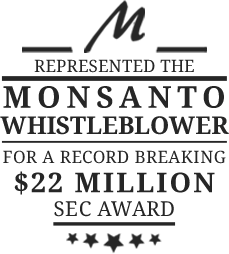Types of Accounting Fraud the SEC Is Interested In
Of all the fraud types regularly investigated by the Securities and Exchange Commission (SEC), accounting fraud is easily one of the most prevalent and widespread—not to mention diverse.
The people who commit accounting fraud seem to be endlessly creative, manipulating numbers, ledgers, and spreadsheets in a myriad of different ways that all serve the purpose of hiding fraudulent activity or obscuring huge losses.
If the numbers at the company you work for don’t seem to be adding up, or if you’re a shareholder who’s suspicious of the accuracy of the issuing company’s quarterly earnings reports, you very well may have encountered a type of accounting fraud the SEC would be interested in.
If it turns out that accounting fraud is taking place, you could become a whistleblower, tip off the SEC, and earn yourself a sizable reward in the process—which is why it pays to be acquainted with some of the more common types of accounting fraud.
Non-GAAP Measures and Accounting Fraud
Most—but not all—types of accounting fraud will involve the use of non-generally accepted accounting principles (non-GAAP). These principles include any non-standard accounting practices.
Non-GAAP measures are often confusing and counterintuitive, which is often the point. They’re frequently employed to hide money trails, income sources, and financial losses.
By obscuring this information, a guilty company hopes to prevent investors and the SEC from discovering something that would either be illegal or lead to the company’s collapse. When the books aren’t making sense, it may be because non-GAAP measures are hiding something someone doesn’t want found.
Cookie Jar Reserves
Cookie jar reserves are a form of accounting fraud that can be surprisingly easy for companies to pull off. Using cookie jar accounting, companies record large losses and expenses from one period against other periods that were financially profitable.
Cookie jars allow companies to hide losses and financial turbulence from investors, making this a very obvious form of fraud. Financial information of this nature is most definitely material to investors.
Revenue Recognition
Revenue recognition scams seek to hide the source of income through accounting. This type of fraud is often involved in money laundering. Companies, banks, and white-collar criminals use shell companies and sham transactions to hide what the true source of their revenue is.
These fraudulent accounting practices can also be used to claim revenue before it’s been earned and to artificially inflate sales numbers. The SEC is nearly always interested in these types of cases, as investors can be easily fooled by a guilty company’s too-rosy earnings reports.
Auditor Independence Violations
The SEC does not look kindly upon auditors who assist in accounting fraud. Auditors are intended to keep accountants honest, so when an auditor’s independence is compromised, it can lead to substantial financial misconduct.
These violations include auditors who develop improperly close relationships with their auditees, and companies who threaten, intimidate, or harass their auditor into publishing the findings that they want.
Help Exposing Accounting Fraud
If you believe that you’ve encountered a type of accounting fraud that the SEC would be interested in, Meissner Associates can help you report it to the SEC so that you can claim a whistleblower reward.
To get started with a free, confidential tip evaluation, just complete the contact form below or call us at 1-866-764-3100.









